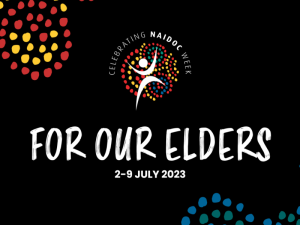
“Our elders to this day are the beating hearts of our communities and our families. Our elders were once in a place where they bared our pains, mistakes and struggles, so that we can live somewhat comfortably. Now, as the younger generation get older, we have a big responsibility to uphold and continue the fight that our elders have been doing for centuries before.”
Jaz, care leaver
As we reflect on the theme of NAIDOC Week, ‘For our Elders’, we look to our parents, aunties, uncles, nannas and grandfathers. Our Elders are more than just family members, they are the survivors, they are leaders and they are changemakers. Elders guide and teach us, they are holders of cultural traditions, language and knowledge, story tellers and tireless advocates for children and young people, families and communities – this goes beyond just their immediate family circles. They are there for us always and forever.
NAIDOC week invites us to celebrate them and the strength of First Nations children and young people. Whilst we undertake these celebrations, let’s also reflect on the experiences of children and young people in care. Some who have not had connection to culture or indeed to their Elders. It must be difficult to engage and participate in the amazing cultural activities and celebrations, when every other week of the year such celebrations are not front and centre, as they are in NAIDOC week.
What we know is that, when children and young people in care are engaged and supported to connect with families and culture and their Elders, their outcomes are simply better. The role that cultural empowerment and connection plays is pivotal for a sense of belonging and healthy growth and development. It is wonderful that we get to celebrate and engage in things like NAIDOC week and the fun activities. It is equally important to bring these important moments into every week and every day of a child’s life, whether they are in care or within their family unit.
‘For our Elders’ reminds us that we all have a role to play in making sure that Aboriginal children and young people have every opportunity to grow up surrounded by their culture, and know the love and guidance of their Elders. In the words of Andrew Jackomos, the first Commissioner for Aboriginal Children and Young People in the country:
“Culture is not a ‘perk’ for an Aboriginal child – it is a life-line”
And so, with this let’s keep our minds and hearts to connecting children and young people to their life-line. Because, as time goes by, they too may become Elders that share their cultural knowledge, tell stories of their ancestors and guide the next generation.
